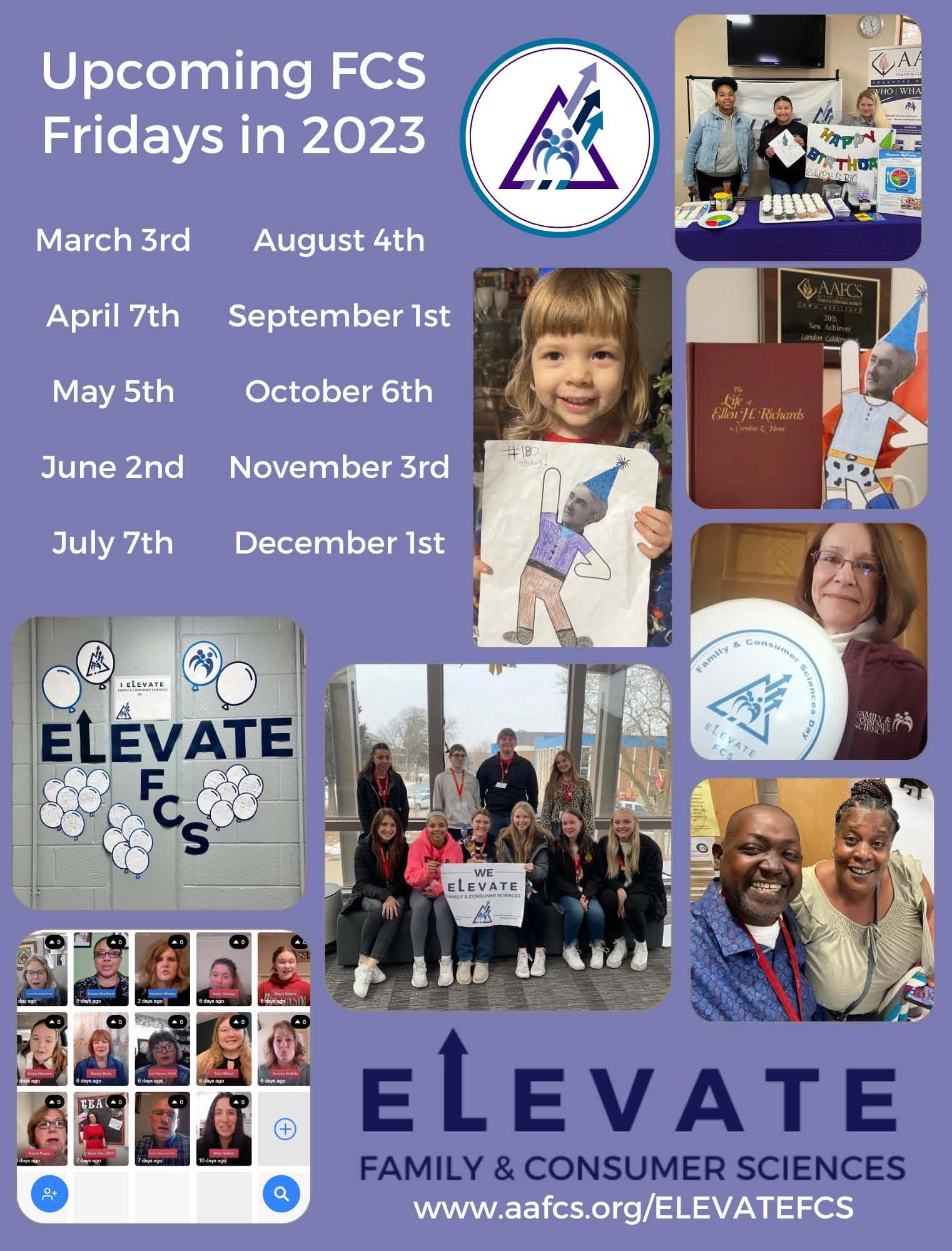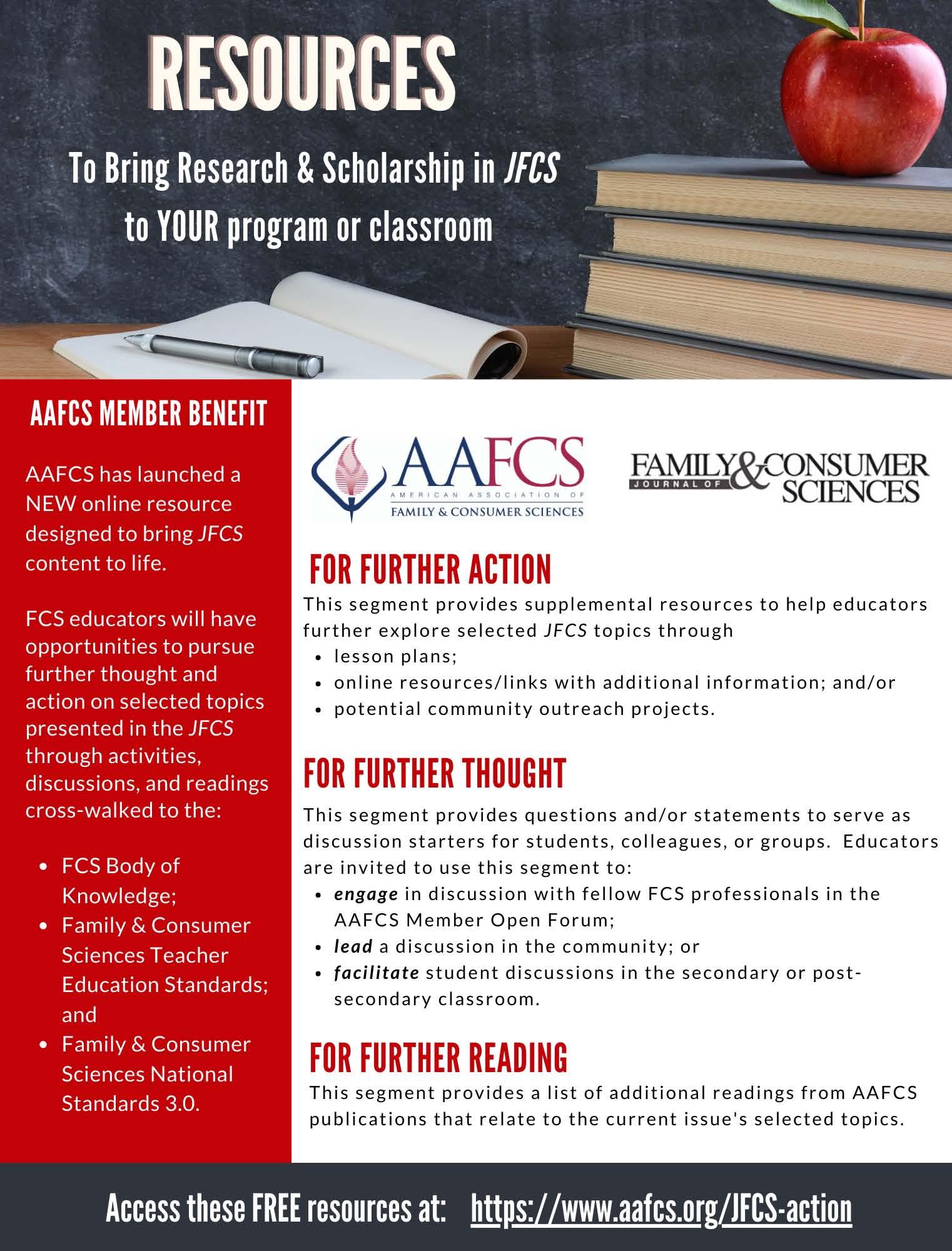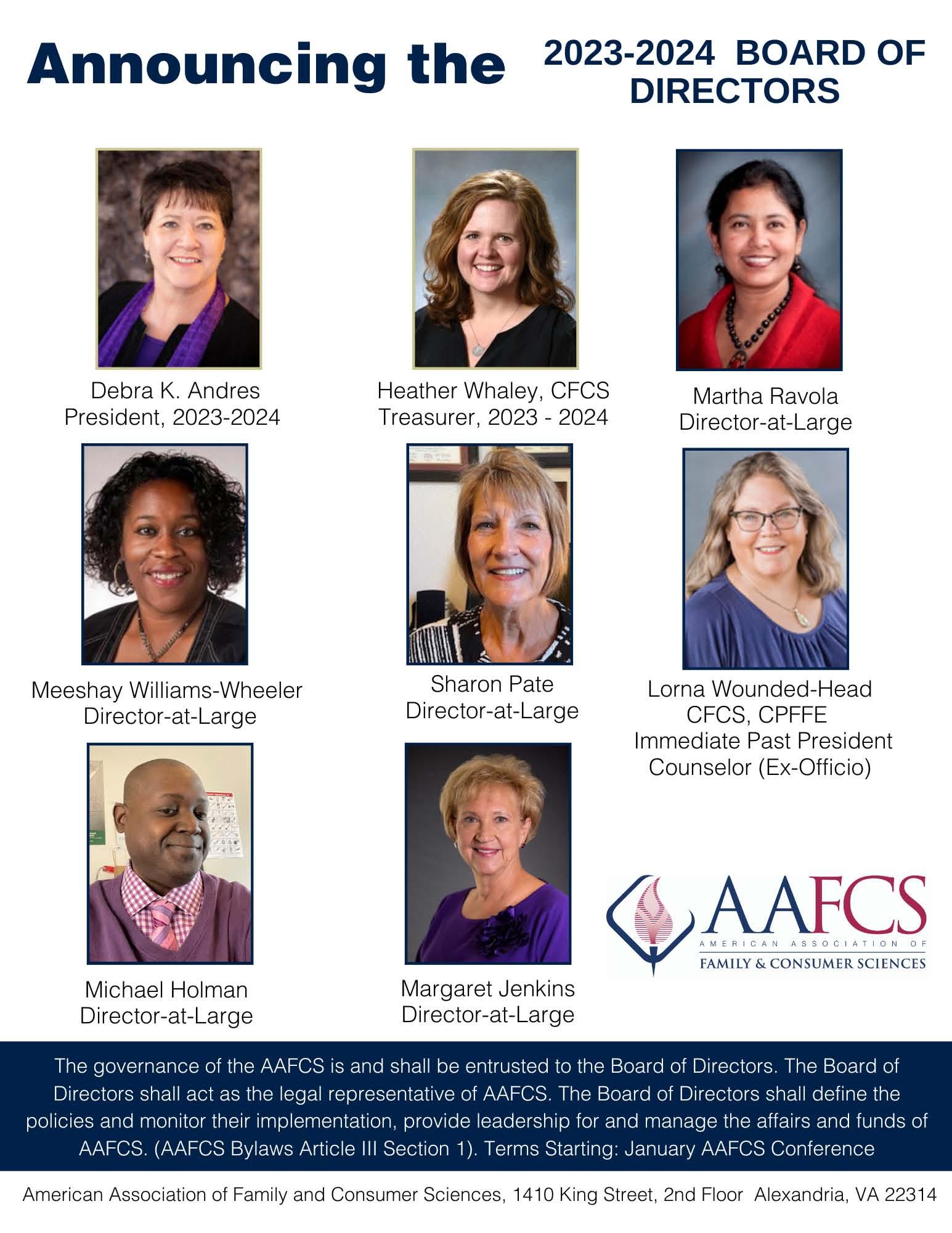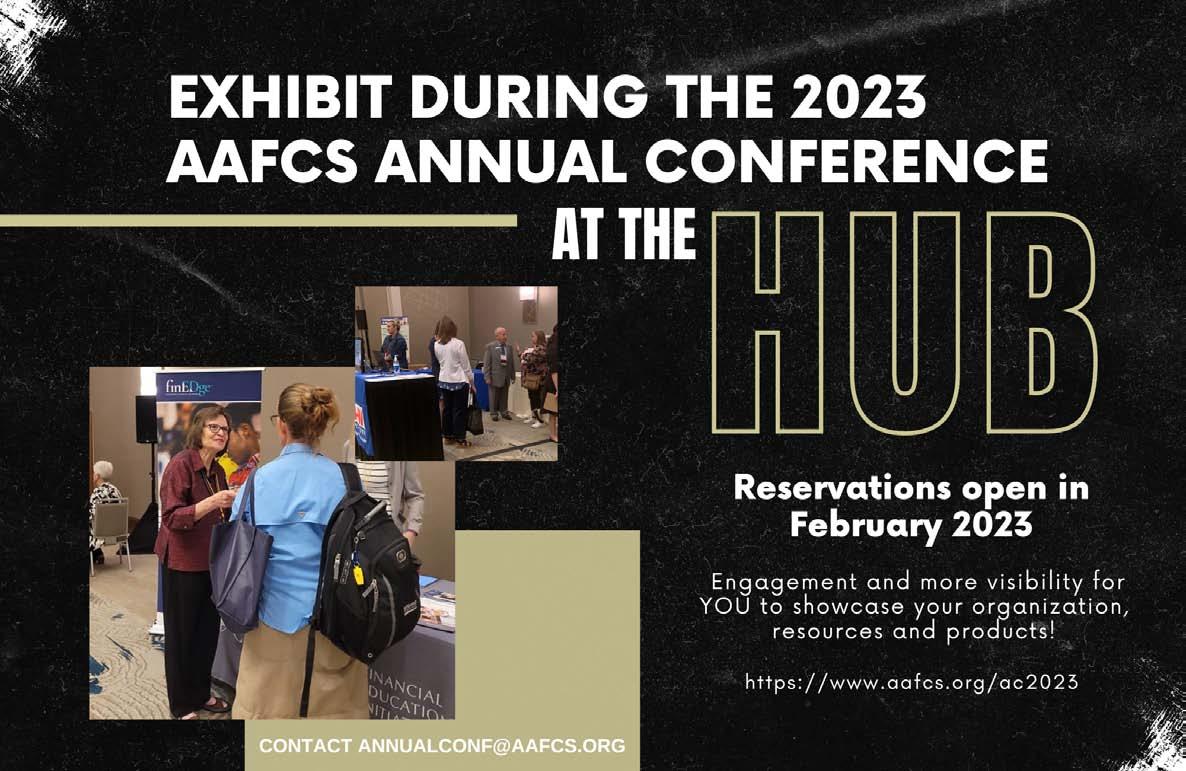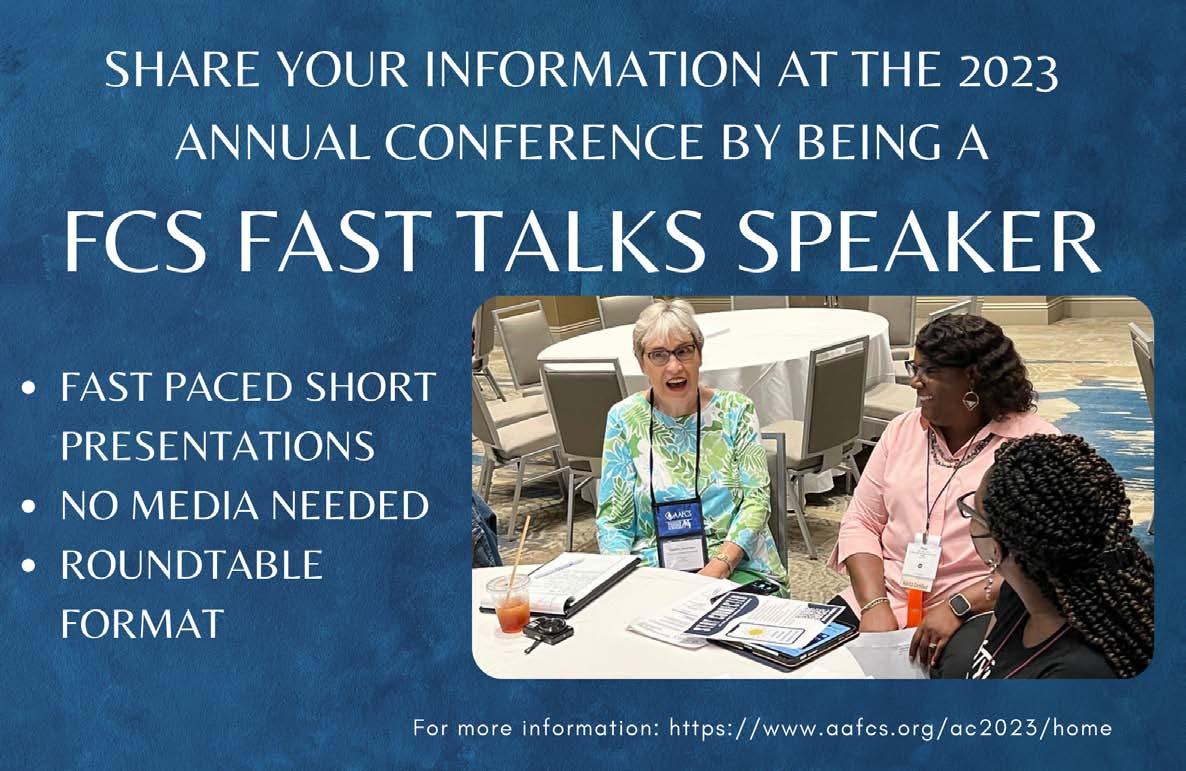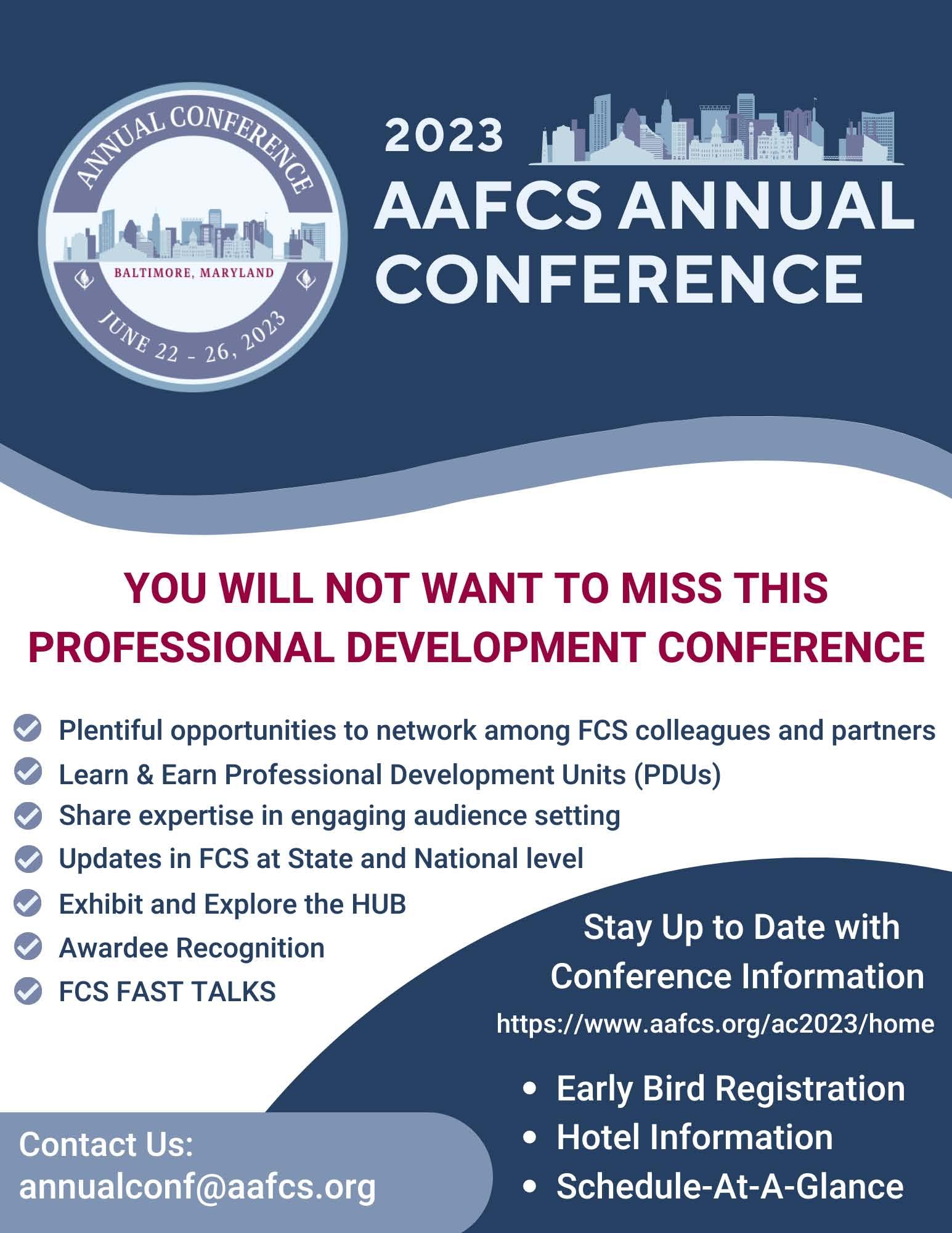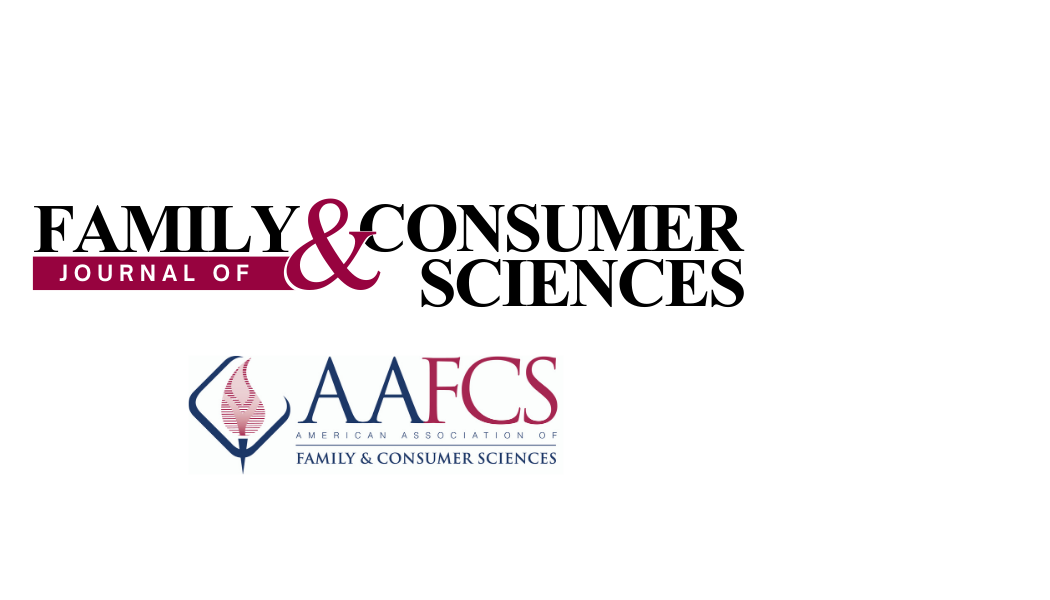
28 minute read
Jewell Deene Ellis: Her Legacy To Listen, Engage, Communicate
Dr. Jewell Deene Ellis’s visionary, quiet, and determined leadership shaped the family and consumer sciences (FCS) profession in Kentucky and across the nation for almost 6 decades. Ellis’s influence was greatest in educational policy development and the establishment of national standards for FCS education. Her efforts had a positive impact on every FCS program in middle and senior high schools, post-secondary and adult education, and higher education. A research study was initiated to document and tell her story and share personal reflections.
Few individuals exhibit the breadth or depth in family and consumer sciences (FCS) as Dr. Jewell Deene Ellis. She is a rare individual who leaves her chosen profession better for multiple generations into the future. During her 57-year career (1951–2008) in various roles in education and education policy advocacy, Ellis provided assistance and leadership to students, teachers, families, schools, state agencies, and professional organizations. Her most visible influence was in policy development and establishment of national standards for FCS education (Henry & Miller, 2016). Her influence on students and colleagues contributed significantly to the field. In recognition of her lifetime of contributions and achievements, Ellis received an Honorary Doctorate in Humane Letters (2017) from her alma mater, the University of Kentucky (UK). Reflections on her childhood, formal and non-formal educational experiences, her teaching and administrative roles, and her engagement in education policy advocacy add to the rich personal histories that undergird FCS.
Methodology
To gain an understanding of Ellis’s career and contributions to FCS, a multi-method study was undertaken. Nickols (2017) described methods for historical research and advocated for a multi-method approach to add depth and breadth to understanding the people, events, and philosophies that have shaped FCS. This study explored two research questions:
1. What experiences contributed to Jewell Deene Ellis’s growth and development as an FCS leader and professional?
2. How did Jewell Deene Ellis have an impact on FCS-related education policy within multiple organizations and institutions?
The approach combined oral history, in-depth interviews, biography, and documentary research. A series of questions used as an interview guide were developed by the author and shared with Ellis. Ellis’s life story was discussed during four sessions held in her home, on her family farm, and in the local community center located in the converted high school. The author consulted documentary sources for corroboration and additional information. After integrating the narratives, summarizing the interviews, documentary information, and personal interpretations, the author discussed the details with Ellis in person and via email. She provided additional context, clarification, and corrected inaccuracies.
Ellis’s Early Family Life
Jewell Deene Ellis was born on October 11, 1928, to Cecil Tilden Ellis, Sr., and Alma Lou Whitehouse Ellis at Puss Minor Place, in Boyle County, Kentucky. The Ellis and Whitehouse ancestors migrated to Kentucky from Virginia, Maryland, North Carolina, and Pennsylvania in the late 1700s and early 1800s. The family has identified 13 generations, which include a direct linkage to Nancy Hanks, Abraham Lincoln’s mother (Sheperson et al., 2009). The oldest of 11 children, Ellis’s early years were anything but boring. As a child, she worked beside both parents in the fields, garden, and house. She shared much of the work with her sisters, Shirley and Barbara. Shirley was born 1 year after Jewell Deene, followed by Barbara
2 years later. Six of the Ellis sisters kept home economics (HE) in the family—Jewell Deene, Barbara, Shirley, Wilma Rae, Kaye, and Karen; they all were HE graduates from the University of Kentucky (AHEA, 1970). Marlena, Cecil Jr., Dale Keith, Darrell, and Barry pursued other professions.
I do come from a large family. We were a hard-working farm family. We grew tobacco, fed cattle, and had a garden in the summer. We canned stuff for winter. We had a cellar that was in the side of a hill behind the house. We all had jobs to do. The older ones had to take care of the younger ones. I worked outside and in the field a lot. I helped with the tobacco. Stripping tobacco would be something we would do when we were home at Thanksgiving from college. If we did not finish, we would do it at Christmas too.
Education was important to Ellis’s parents. When Ellis started school, her parents were disappointed by the quality of their local schools and decided to sell their farm in Gravel Switch, Kentucky, and purchase another in Forkland, Kentucky. Forkland had a good school that they felt would meet the needs of their growing family. At age 7, Ellis entered first grade and discovered a love of school and learning. At age 10, Ellis joined the local 4-H club. It was in those school-based 4-H meetings that her connection to HE began.
It was really something when the county agent and the home demonstration agent came to the school to have 4-H club meeting—that was a big event. When I was old enough, I went to 4-H camp every summer. That was a big affair. That was the event of the summer—to go to 4-H camp. Jennie Grubbs was my home demonstration agent.
When a secondary school was not available in Forkland, Ellis’s father and grandfather sold three acres to the Board of Education for $750 for a new secondary school. The community members imposed a local tax to keep the school operational. A few years later Works Progress Administration (WPA) workers built the gymnasium from limestone taken from local fields and creeks. To the Ellis family and the people of Forkland, education was critical.
College
Ellis’s mother had taken a few courses in high school domestic science, which inspired Ellis to consider HE as a major. College for the Ellis children was always a given.
Mother and Daddy wanted all of us to do something beyond high school. They were a big influence. Going to college, not necessarily where you went, but going was instilled in us as we grew up. I said early on that the only place I ever want to go to school is the University of Kentucky.
In fall, 1947, Ellis arrived at the UK campus. Her college years were active and happy ones. She joined the Home Economics Club, serving as president in her senior year. The Club was active in Farm and Home Week, hosting people from all over the state and serving lunch as a fundraiser. In her dormitory government organization, she served as an officer. She was also active in the university 4-H Club and the League of Women Voters. Ellis’s student teaching occurred at Old Kentucky Home High School in Nelson County, which was the newest and best equipped high school in the state.
As with many college students, adventures abounded. Ellis had one that delights listeners even 70 years later.
This happened during Shirley’s and my junior year at Thanksgiving. We just had the biggest snowstorm. We just had to get back to school, because UK had a regulation that if you missed the day before or after a holiday, another credit was added to your graduation requirements. Daddy put chains on the car, and we drove to Danville to catch the train into Lexington. The train was late from a football game in Knoxville. When it finally arrived, it was full and the only place to ride was in the baggage car. So, we did! We had to stand up most of the time and we rode with boxes of chickens and a corpse!
she taught for 9½ years. They were good years filled with classes, student organizations, adult education, and home visits. As a teacher in the early 1950s, Ellis was one of three teachers in Kentucky who piloted a Better Home Living curriculum that included both males and females. It became her favorite class and served as a model for other teachers to expand their curriculum to include family relations, management, and consumer education (Ellis, 1990).
Professional Years
Nicholas County Home Economics Teacher
Following graduation, Ellis became the HE teacher at Nicholas County High School where
Nicholas County had a little town. I had a room in a lady’s house with kitchen privileges. I paid $25 a month; my take home pay was $189 a month. When I moved to Murray State, my salary almost doubled. And I thought that was a huge salary! While I was at Nicholas County High School, I supervised 30 student teachers; Sue Couch was one of them. I had some good student teachers while I was there. Some of them became teachers and some of them went into the school lunch program. I made sure that every student teacher went on a home visit and helped me teach an adult class.
Over the years, she declined several new job opportunities, but began to worry that she might not receive additional offers if she kept turning them down. In 1960, the offer she could not refuse was presented. Dr. Ralph Woods, President of Murray State University, invited her to join the Murray State faculty and become the first “itinerant teacher” for HE in Kentucky.
International Farm Youth Exchange
One of the most impactful experiences of her life occurred after Ellis’s second year of teaching when she was selected for the International Farm Youth Exchange (IFYE) sponsored by the National 4-H Club Foundation, Cooperative Extension Service of the U. S. Department of Agriculture, and Land Grant Colleges and Universities (Anti-Defamation League of B’Nai B’Rith, 1954). Ellis was selected to travel to Israel; she soon discovered that Israel was 6,247 miles away from Kentucky and a world away culturally. Residing in an Israeli kibbutz in 4-yearold Israel in 1952 was the cultural opposite of her life as a girl from Kentucky. Many people asked her parents why they ever let her go.
I had my choice of country, so I thought, if I’m able to do something like this, I’m selecting the country furthest away and Israel was it. I stayed at five different places, the first one was Degani Bet near the Jordan River. The second oldest kibbutz in Israel, it was a collective settlement where residents owned everything collectively. Children were taken care of collectively in a childcare center until age two. I worked in the kitchen, washing dishes. Somebody came in who spoke English and said, oh, they know how to work. They just thought we were all rich and didn’t know how to do things. I also worked in their gardens, oftentimes before daylight.
At the second settlement, Moledet, close to Nazareth, people collectively owned farmland, but individually owned their homes. When we were at Beer Tuvia kibbutz, we traveled on a horse drawn wagon through the desert. In Benyamia, we received the royal treatment when we visited a Bedouin village and met villagers in a beautiful tent with wall-to-wall carpet and drank very strong coffee. It was a life changing and memorable experience.
Returning from Israel provided Ellis with her first opportunity on the national stage. As she stepped off the Queen Elizabeth ship, she was greeted by a CBS crew from the Edward R. Murrow show. After a quick introduction, they indicated they would see her in Kentucky. They arrived in Gravel Switch and interviewed Ellis about her time in Israel and joined her for a community presentation about Israel. The show included United
States Vice President Alben Barkley, who was from Kentucky. He discussed the importance of 4-H and the IFYE experience (Friendly & Murrow, 1953).
Murray State University
Her position at Murray State University brought opportunities to guide and mentor others, a role in which she thrived. Visiting HE teachers across western Kentucky enabled her to have an impact on educators far from the Kentucky State Department of Education. It was not long before the Kentucky state education leaders urged her to join them. Ellis accepted a position in Frankfort where she remained for the rest of her career.
State Department of Education
In 1971, Ellis was named assistant director of the Home Economics Division of the Kentucky Department of Education, and 1 year later was named director. She succeeded her long-time mentors Mary Bell Vaughan and Mary Lois Williamson, well-known, prominent state and national HE leaders (Ellis et al., 1982a; 1982b). Ellis flourished in her state leadership roles; her colleagues and the programs prospered as well.
Ellis was a team player who sought to support and collaborate with her supervisors and colleagues. One of her colleagues recalled,
Jewell Deene just has a way about her. She’s a kind, considerate, diplomatic leader. She could sit down, talk things through until you either came over to her way of thinking or you worked it out. I do remember when she wanted me to do something and I said, oh, I don’t think I can do that. Jewell Deene talked me through it until I felt I could do it. She’s very diplomatic in working with people; that’s why she was such a success in Washington (personal communication, G. Ellington, July 26, 2021).
Ellis summarized her perspective on interpersonal communications:
People didn’t always agree with me. I listened to people. I think it’s really, really important to listen to people. If you can agree, fine, but if you can’t, it’s okay to say you don’t agree with them. But you can do that in a nice way.
Above all, Ellis was an advocate for and supporter of teachers. Programmatic and curriculum decisions centered on what served students and teachers.
She met with teachers. She met with groups of teachers when she started anything new. She got their buy-in. Other teachers would buy-in because they knew the teachers who were on the committee Jewell Deene formed (personal communication, G. Ellington, July 26, 202l).
She set an effective course of action focused on ways to remain relevant and timely so teachers could provide strong and pertinent programs.
One thing that I’ve always said to teachers is that you have to keep up with the national trends. What’s going on in the country, what’s going on in the family? Teachers are so busy, they don’t have time to keep up with all that, but that has to be done. And that’s the reason you revise curriculum every seven or eight years to keep up with what’s going on.
While advocating and supporting teachers, Ellis also held high expectations for teachers. In correspondence to then American Association of Family & Consumer Sciences President Sharon Nickols (2002–2003), she listed characteristics of excellent teachers: implements the profession’s vision and mission, aligns curriculum with national standards, uses diversity of teaching and learning styles, supports the community, integrates technology, develops problem solving and critical thinking skills, and participates in professional development (personal communication, J. D. Ellis, October 21, 2021).
Kentucky Vocational Education Association
From 1984–1988, Ellis served as executive secretary of the Kentucky Vocational Education Association, where she was involved in the educational reform efforts undertaken by the Commonwealth of Kentucky. Under Governor Martha Layne Collins, Ellis was appointed to the Commission of Vocational/Technical Education that examined the entire system of vocational education and proposed restructuring the state administrative unit and its funding. As a result, the State Board for Adult and Vocational/Technical Education was established. Secondary vocational education continued to be governed by the State Board of Education with a charge to better integrate academic and vocational education (Commission on Vocational/Technical Education, 1986).
National and State Leadership
An important part of serving in the State Department of Education was stepping up to the national stage to ensure that programs were aligned with the direction of the field and that they had adequate resources. Ellis never hesitated to do her part nationally as evidenced by her numerous contributions.
Her career spanned years of political, economic, and societal turbulence and change in the world, including changing roles for men and women and changes in definitions of family. Throughout it all, she maintained a steady hand and helped guide the evolution of the family and consumer sciences program through leadership at the state and federal levels. She was decisive and deliberate in maintaining core principles within the field but was a leader in changing curriculum and focus to meet changing societal and family needs. (A. Carr, personal communication, March 29, 2017)
National Coalition for Family and Consumer Sciences Education
Early in her career, Ellis was selected to serve on the National Coalition for Family and Consumer Sciences Education, a challenging national role with consequences for all states. In 1977, three professional organizations with interests in HE education, American Home Economics Association (AHEA), American Vocational Association (AVA), and Home Economics Education Association (HEEA), established the National Coalition for Home Economics Education to increase communication and present a unified focus on issues (Coalition, 1979). In 1979, Ellis was invited to join the Coalition representing AHEA.
Thus began her involvement in the legislative process. This appointment illustrated her philosophy of being prepared when opportunities presented themselves and if you were not prepared—get prepared! She recalled:
I remember when Camille Bell left the Coalition and there had to be a new chair. Somehow or other, I was appointed as chair. I said, Camille, I can’t do this. I mean, I knew nothing, I knew nothing about working with legislators, much less knowing them. And I had to learn quickly. I just did. I just had to learn a lot.
Ellis served as chair of the Coalition from 1985 to1990. She quickly honed her skills as an advocate and public policy influencer. First and foremost, she knew the importance of building relationships with everyone involved in the process, including the congressional members, their staffs, and other advocates. In Kentucky, she focused her efforts on William Natcher and Carl Perkins. Both were senior members of Congress who had risen to the highest leadership ranks. She built strong relationships with both men and interacted with them until their deaths.
Ellis discussed what contributed to the Coalition’s success when working with elected officials at all levels.
When I started, I didn’t know Representatives Perkins or Natcher. So, get to know your legislators, their style, and what they care about. Before you got into the real business, Representative Natcher always wanted to talk about current events, his family, and you. Mr. Perkins wasn’t really that way; he was more of a get to the point person. Learn their personalities to determine how you approach them.
I soon learned that you needed to know the staff and have them on your side. Bettilou Taylor, in Mr. Natcher’s office, was so helpful to us. After Mr. Natcher died, she went over to the Senate, and she was the chief of staff for Arlen Specter. She told me she could still help us even though she no longer worked with Mr. Natcher—and she did.
Ellis listened closely to feedback from members of Congress and their staff and took actions to respond. Two consistent themes in their feedback were the lack of data regarding program impact and the influence of stereotypes on Congressional understanding of HE education. Under the auspices of the Coalition, she undertook the development of materials addressing program impact. The materials addressed stereotypes with examples of current programming and outcomes. This resulted in an exhibit at the U.S. Capitol, Senate Display of Outstanding Consumer and Homemaking Programs, which was attended by members of Congress, their staff, and key HE leaders from around the country. Following the exhibit, the Senate Appropriations Committee approved a budget authorization that was $1 million more than originally requested (Ellis, 1990).
It’s also important to know the legislative process. What a lot of people didn’t realize was that Mr. Perkins’ committee wrote and authorized the legislation. That was done every five or six years. But for it to be appropriated, that occurred every year. The Coalition worked with Mr. Natcher every year to make sure it was funded. I testified more with Mr. Natcher than I did with Mr. Perkins.
You also must be aware of what states were doing, really doing. Not what you hope they were doing. I always made sure to use good examples from committee members’ states. The Coalition always had a plan of action—what you are doing, when you were doing it, and who was involved. And that was one thing that kept the group together. Anytime that I presented testimony, I first gave an opening statement and said something about the big picture of vocational education. Otherwise, I don’t think we would have been funded. You had to look at the bigger picture. I doubt very seriously family and consumer sciences alone would have been funded.
Overall, Ellis testified five times—four times before the House Appropriations Subcommittee on the Departments of Labor, Health and Human Services, Education, and Related Agencies (1985, 1986, 1987, 1988), chaired by William H. Natcher (KY); and one time for the reauthorization before the Senate Subcommittee on Education, Arts, and Humanities, chaired by Claiborne Pell (RI) (1989). As with many things, timing played a role in the series of successes related to Congressional action. Rarely does one state have a Representative serve as chair of the authorization committee and another Representative serve as chair of the appropriation committee hearing the same piece of legislation. This confluence of committee chairs and Ellis’s service on the Coalition was fertile ground for the resulting relationship between Representatives Natcher and Perkins and Ellis (Ellis, 1990).
After stepping down as chair of the Coalition, she served in an advisory capacity for several more years. During this time, she had a front row seat to three authorizations and annual appropriations. It would be hard to determine the countless number of young people affected by her involvement in these important legislative activities. Her main lesson regarding influencing legislation is “one voice matters.” Above all, she still believes in the power of one voice.
I’m going to say this, some people will say, one voice or one contact doesn’t make that much difference. Well, I would disagree wholeheartedly. It does make a difference. People don’t realize how much, but it does. Just helps to get it done.
National Standards for Family and Consumer Sciences
The development of national standards was a significant achievement in FCS and Ellis was at the forefront of that effort. One of the first to step forward, she served on the project management committee throughout the 2-year development process (National Association of State Administrators of Family and Consumer Sciences Education, 1998). The FCS national standards had an impact on the field in two principal ways: (1) the standards formed a foundation for public policy by clearly communicating a unified focus for FCS education; and (2) the process used to develop the standards involved unprecedented collaboration and unification across the FCS education community (Hetherly, 2000). effort.
They still think we make brownies all day . . . . I didn’t talk about that when working with the legislature, but I ran into some of that when I was working on the Hill. I would just sit down and talk about what one teacher might do, what they might teach. They understood it. I know that old image was out there. I felt like the national standards helped to remove that to some extent. I really valued the time that we spent working on the national standards. It was a big step forward. We were the only vocational area group that worked on them for a while. Finally, the agricultural people got on board.
The national standards communicated the priorities of the field to a wide range of stakeholders, serving as a symbol of legitimacy for FCS educators, presenting a level of authority to constituents of education, and signaling a commitment to visible standards. Above all, they were a symbol of hope for practicing professionals that the curriculum would prevail during a turbulent time for educators (Vail, 2000). Ellis knew the full range of contributions the standards could make and never wavered from pushing them forward.
As I think about it, I believe the national standards are the most important thing we have ever done.
Future Homemakers of America Name Change Committee
Two years after the Scottsdale meeting, the student organization Future Homemakers of America
(FHA), affiliated with the FCS profession, grappled with their name. Once again, Ellis was called upon to head the committee that would lead the decision-making process. The committee was charged with establishing guidelines for leading, analyzing, and synthesizing input from focus groups and submitting recommendations to the FHA/Home Economics Related Occupations (HERO) Board of Directors.
The committee that looked at the name change had one big problem and the problem was the HERO part. Because it was FHA/HERO. They liked the word family. And they liked community because kids did a lot out in the community. But the hang up was the HERO part. We just kept working and talking through the HERO part until we came up with career. Family, Career and Community Leaders of America (FCCLA) was finally approved. But the more I think about the name change, Family, Career and Community Leaders says it as well as anything. That was hard because there were so many people that had grown up with it as FHA.
University of Kentucky
Throughout her life, Ellis was committed to her alma mater—the University of Kentucky—and was present at many pivotal times. She served as president of the alumni association and as a member of search committees for most of the deans selected to lead the College of Human Environmental Sciences. Over the years, she served on numerous college and department review committees. For more than 2 years following the dissolution of the College of Human Environmental Sciences, she worked with other alumni to ensure that the departments that comprised the College remained together. As a result, the School of Human Environmental Sciences was formed. Since her graduation in 1951, she has seen it all.
When you go back and look at the very beginning of domestic science it started as a department. They were in the basement of the old agricultural building. It was a department. It’s been a college and it’s been a school. I have hopes that somehow the college will emerge again. I don’t know when and I don’t know how, but it will rise again. There has to be something there for it to have stayed on a university campus that long, even though it’s in a different form. I just think it will come back some way. It’s survived all these years some way.
Along with her five sisters, Ellis established the Ellis Family Scholarship in memory of their parents. She was designated a UK University Fellow. In 2000, Ellis was one of five inaugural members in the College of Human Environmental Sciences Hall of Fame. She was designated a Centennial Laureate during the 100th anniversary of the program in 2006.
After Retirement: Family and the Farm
In 2003, Ellis purchased the family farm where the Ellis family had moved in 1935. Although not living there full-time, she has maintained the home much as it was during her childhood. The family returns there frequently for reunions and special occasions. The dining room table where the family gathered for meals, holidays, and the Edward R. Murrow See It Now taping is still there. She looks out the same kitchen window her mother did while finishing dishes and watching the activity in the fields. Her home surroundings include several pieces of cherry furniture built from wood harvested from the forest behind the house. On the edge of that forest is a log cabin her father built when he was in his 70s. It has been a favorite gathering place for scores of grandchildren, nieces, nephews, and other family members. Sitting in the log cabin makes one think about her ancestors who grew up in a Kentucky log cabin, including Abraham Lincoln. Jewell Deene Ellis has a strong sense of place that is deeply rooted in Kentucky. Her pride in family and the land is demonstrated through her preservation of her small corner of Kentucky.
Conclusion
Nationally, Ellis’s contributions are considerable, and they surely moved the profession forward. Her experiences and contributions throughout her 57-year career are significant. Ellis has been a member of the AHEA/AAFCS since her graduation from college in 1953. In recognition of her significant and sustained service to the profession, she received the AHEA Distinguished Service Award in 1995 (AHEA, 1995). She participated in the 11th Lake Placid Conference (AHEA, 1973) and the Future Search Summit (AAFCS, 2006).
Jewell Deene Ellis’ approach was a way of being—“Listen, Engage, Communicate”—and she exemplified this way of being as she approached her work and the people involved. She brought that outlook to her life’s work. Repeatedly, she emphasized the importance of listening, of really hearing what people were saying. She engaged thoughtfully and deeply with those with whom she disagreed; evidence of staying engaged was ever present. Ellis talked things through until a process was complete. This approach worked for her and for FCS because she communicated effectively. Ultimately, it was this approach that led to her accomplishments. Her way of being was the reason people sought her for guidance, leadership of challenging endeavors, and communication with power brokers. In seeking lessons from the life and legacy of Jewell Deene Ellis, we would be well served to emulate her way of being—listen, engage, communicate.
References
American Association of Family & Consumer Sciences. (1995). 1995 Distinguished service award recipients. Journal of Home Economics, 87(3), 57.
American Association of Family & Consumer Sciences. (2006, January). Future search summit. Author.
American Home Economics Association. (1970, April). The Ellis sisters: Keeping home economics in the family. Journal of Home Economics, 62(4), 280.
American Home Economics Association. (1973, October 14–17). Lake Placid conference summary report. Author.
Anti-Defamation League of B’Nai B’Rith. (1954). Other hearts in other lands: American farm youths visit Israel. Author.
Coalition for AHEA, AVA, & HEEA. (1979, January). Vocational Home Economics Education: Coalition Statement
1. Home Economics Education Association.
Commission on Vocational/Technical Education. (1986). The role of vocational/technical and adult education in the economic future of Kentucky: A plan for the future Author.
Departments of Labor, Health and Human Services, Education, and Related Agencies. (1985). Appropriations for 1986: Hearings before the Subcommittee of the House Committee on Appropriations, 99th Congress, 450. (Testimony of Jewell Deene Ellis).
Department of Labor, Health and Human Services, Education, and Related Agencies. (1986). Appropriations for 1988: Hearings before a Subcommittee of the House Committee on Appropriations, 100th Congress 659. (Testimony of Jewell Deene Ellis).
Department of Labor, Health and Human Services, Education, and Related Agencies. (1987). Appropriations for 1987: Hearings before the Subcommittee of the House Committee on Appropriations, 99th Congress 1063. (Testimony of Jewell Deene Ellis).
Departments of Labor, Health, and Human Services, Education, and Related Agencies. (1988). Appropriations for 1989: Hearings before the Subcommittee of the House Committee on Appropriations, 100th Congress. 23 (Testimony of Jewell Deene Ellis).
Ellis, J. D. (1990, April 30). Interview by A. Thompson [Tape recording] History of education in Kentucky: Education reform oral history project. Louie B. Nunn Center for Oral History.
Ellis, J. D., Foster, A., & Henry, S. (1982a). Mary Lois Williamson In L. Bailey & B. S. Davis, (Eds.), Seventy significant leaders (pp. 298–301). McKnight Publishing Company.
Ellis, J. D., Foster, A., & Henry, S. (1982b). Mary Bell Vaughn In L. Bailey & B. S. Davis, (Eds.), Seventy significant leaders (pp. 287–291). McKnight Publishing Company.
Friendly, F. W., & Murrow, E. R. (1953, January 4). 4-H club members return from Turkey, Israel, and Lebanon. [Television series episode, Season 2, Episode 18]. See it now. CBS Broadcasting.
Henry, S., & Miller, S. W. (2016). Jewell Deene Ellis In J. McFadden, R. A. Ball, & L. W. Booth (Eds.), Leaders in family and consumer sciences (pp. 183–188). Kappa Omicron Nu.
Hetherly, J. A. (2000). Influencing public policy. In A. Vail, W. S. Fox, & P. Wild (Eds.), Leadership for change: National standards for family and consumer sciences education (pp. 264–271). Glencoe/McGraw-Hill.
National Association of State Administrators of Family and Consumer Sciences. (1998). National standards for family and consumer sciences education. V-TECS.
Nickols, S. Y. (2017). Historical research: A lens for family and consumer sciences. Journal of Family & Consumer Sciences, 109(1), 7–14.
S 1109: Reauthorization of the Carl D. Perkins Vocational Education Act. (1989). Hearings before the Subcommittee on Education, Arts and Humanities, of the Senate Committee on Labor and Human Resources, 101st Congress, 87.3 (Testimony of Jewell Deene Ellis).
Sheperson, S., Marsee, K. D., & Taylor, B. E. (2009). Descendants and ancestors of Cecil Tilden Ellis, Sr. and Alma Lou Whitehouse Ellis. Lexington, KY: Self-published.
Vail, A. (2000). Charting our future using national standards: From symbols to action. In A. Vail, W. S. Fox, & P. Wild (Eds.), Leadership for change: National standards for family and consumer sciences education (pp. 272–277). Glencoe/McGraw-Hill.
